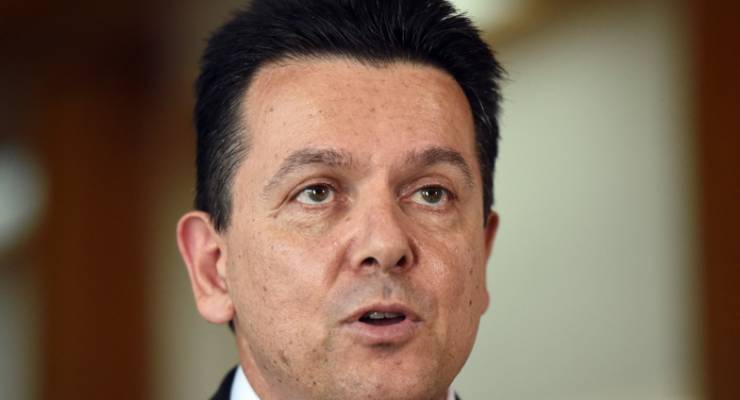
A few short weeks after he looked set to challenge the two-party system that has shackled Australian politics for over a century, Nick Xenophon’s campaign for next Saturday’s South Australian election now appears to be experiencing a reverse bandwagon effect.
Media observers have noticed a certain listlessness afflicting the normally exuberant Xenophon, as questions mount as to whether SA Best’s scattered grab-bag of policies and retinue of little-known candidates can handle the scrutiny of a real-world election campaign.
Two factors explain the media’s perception of a downturn in Xenophon’s fortunes — or three if you want to count the party’s purposefully embarrassing promotional video a fortnight ago.
One is the polls, which may be exercising their occasional pernicious effect of influencing electoral support rather than merely reflecting it.
Before hostilities began in earnest, Xenophon held a clear lead over both Premier Jay Weatherill and Opposition Leader Steven Marshall as preferred premier, but last week’s Newspoll found something approximating a three-way tie, with Weatherill leading Xenophon by one point.
Some of the reportage has exaggerated the extent of SA Best’s decline, particularly in relation to Newspoll’s finding that its vote had slumped from 33% to 21% — about half of which was down to Newspoll dropping SA Best as a response option in the 11 electorates where it is not fielding a candidate.
However, it’s of scant comfort to SA Best if its support has fallen by only 5-6%, as this could potentially mean the difference between the party dominating the next parliament and barely featuring in it.
The point has been driven home by seat polls conducted for The Advertiser by YouGov Galaxy, three of which have dealt with races in which SA Best looks competitive.
Each found the result going down to the wire, but in no case was SA Best actually in front.
The second bad omen is frustratingly familiar to Xenophon, namely the punishing treatment the party has received in its rivals’ preference recommendations.
The Greens have the Liberals ahead of SA Best candidates in 15 out of 36 seats, including the particularly eyebrow-raising case of Waite, where the SA Best candidate is Graham Davies, a former vice-president of the South Australian Conservation Council and chair of the Sustainable Engineering Society.
Xenophon is unlikely to lose an eye on account of anything the Greens do with their how-to-vote cards, given their modest share of the vote and their supporters’ independence of mind in allocating preferences.
However, the major parties are a different matter altogether, as nearly half their supporters follow the card.
Particularly troubling for Xenophon is Labor’s supposedly even-handed approach in putting SA Best behind the Liberals in half the seats where they are running, a discourtesy that is rarely if ever extended to minor parties that aren’t explicitly of the hard right.
Labor has even smoothed the path for Steven Marshall to be re-elected in his dicey seat of Dunstan in Adelaide’s inner east.
The Liberals have been less unkind, despite their complaints that SA Best was focusing on their seats as part of a strategy to ensure they emerged with the balance of power.
But in the electorate of Hartley, which Nick Xenophon is contesting, Liberal as well as Labor are running split tickets, while both the Greens and Australian Conservatives have Xenophon behind the Liberal incumbent, Vincent Tarzia.
If it’s indeed the case that SA Best wins nearly a quarter of the vote and ends up with little or nothing to show for it, the party will still play kingmaker to the extent that the election will be decided by its preferences.
As always, Xenophon is advising his supporters to make up their own mind — which 60% of them did in Labor’s favour at the 2016 federal election.
If they do so again, the end game might well be that a 16-year-old government with its credibility in tatters over the Oakden nursing home scandal limps back for another four-year term, despite having received less than a third of the primary vote.








It’ll be all night on the Right.
“Steven who?”?
Maybe they should get Frydenberg and Tuppence to come over and campaign for them?
You know, Shanghai Steven.
A further reason for the decline might be the massive ugly, negative campaigning directly again Xenophon by SA Unions AND the Liberals.
Maybe Nick should ride around town on a uni cycle wearing a sandwhich board while juggling steak knifes and with a pet monkey on his head grinding an organ while singing the national anthem in Greek!
We have a preferential system of voting in this country. It is NOT new. So whoever wins will be the ‘preferred’ government. Get over it!!!
As a South Australian, I am not aware that any Labor politician actually worked in Oakden and abused any residents…they didn’t even know it was happening, for Ch+^t’s sake. Neither did any other politician know it was happening. The whole disgusting behaviour of the STAFF there has/is being dealt with. What more do you want? Blood???
This politicisation of elder abuse, by Labor’s opponents …and I’m a senior citizen, and a retired registered nurse…HAS TO STOP.
There is much, much more to this election than this particular issue…important as it is. And why no doG’s earth would we want a Liberal government that is ANYTHING like what is going on in Canberra? Hopefully we will leave that to the drongos in Tasmania!!